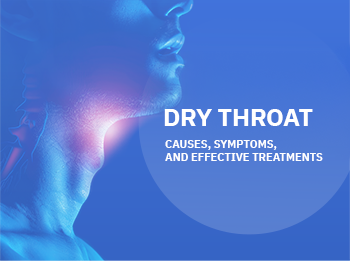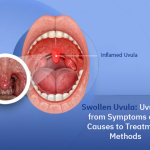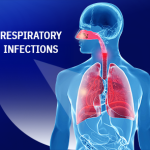Dry Throat
A dry throat is a common condition that affects many people and can significantly impact daily life quality. It occurs when the flow of saliva decreases, leading to various problems ranging from difficulty speaking and swallowing to an increased risk of tooth decay. This condition deserves special attention, as it may indicate deeper health issues or result in unwanted complications.
In this article, we’ll explore everything related to dry mouth and throat, including:
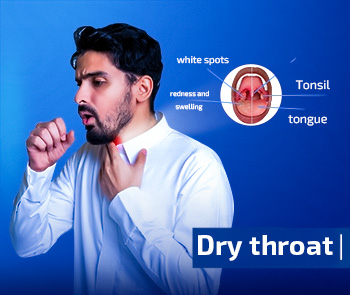
- Causes of dry throat
- Symptoms of dry throat
- Diagnosis of dry throat
- Treatment options
- Risk factors
- Potential complications
Causes of Dry Throat
There are many causes behind a dry throat, including:
Infections
Viral infections, such as the common cold and flu, are among the most frequent causes of dry throat. These viruses affect the upper respiratory tract—including the nose, throat, sinuses, and larynx—and may lead to symptoms like coughing, nasal congestion, and mouth breathing, which all contribute to dryness.
Dehydration
Dry throat may result from dehydration when the body lacks sufficient fluids. Causes include excessive sweating, inadequate water intake, fever, frequent urination, diarrhea, or vomiting. Dehydration reduces the amount of moisture available to keep the throat and mouth hydrated.
Dry Environments
Living in dry climates can lead to a dry throat. Research shows that indoor environments with higher humidity levels lower the risk of dryness or throat irritation. Using a humidifier and avoiding overheated or arid places is recommended.
Allergic Rhinitis
Allergies, particularly allergic rhinitis (hay fever), can lead to dry throat. Triggers like pollen, dust mites, mold, and pet dander can inflame nasal passages, affecting throat hydration.
Overuse of the Voice
Excessive vocal use can lead to acute laryngitis, an inflammation of the vocal cords. It often causes dry throat, hoarseness, temporary voice loss, discomfort, or a dry cough.
Smoking
Tobacco products—including cigarettes, e-cigarettes, and hookahs—irritate the upper respiratory tract. Smoking damages the lining of the throat and lungs, often resulting in coughing and dryness.
Medications
Hundreds of medications list dry throat as a side effect. Drugs for depression, high blood pressure, and others may decrease saliva production.
Cancer Treatments
Radiation therapy to the head or neck can damage salivary glands, decreasing saliva flow and leading to dry mouth. Chemotherapy may also alter saliva composition and reduce gland output.
Aging
Older adults experience dry mouth more frequently due to:
- Reduced saliva production with age
- Higher prevalence of chronic diseases (e.g., hypertension, diabetes) requiring multiple medications that contribute to dry mouth
Symptoms of Dry Throat
When saliva production drops, the following symptoms may appear frequently or continuously:
- Sticky or dry sensation in the mouth
- Dryness in the nose
- Bad breath
- Difficulty chewing, speaking, or swallowing
- Throat dryness or hoarseness
- Dry or cracked tongue
- Altered taste perception
- Burning or painful tongue
- Inflammation or ulcers on the tongue
- Cracked lips
- Sores inside the cheeks
Mouth ulcers and gum disease
Diagnosis of Dry Throat
Diagnosing dry mouth requires a comprehensive medical evaluation. Identifying the root cause is essential for effective treatment.
Medical History
The doctor gathers the patient’s medical background, including:
- Existing health conditions
- Medications and supplements
- Lifestyle habits (alcohol use, smoking, diet, breathing, and sleeping patterns)
Clinical Examination
A doctor will examine the mouth and check for signs of dryness, complications like cavities or oral ulcers, and unusual appearances in the oral mucosa.
It’s worth noting that some patients may appear to have moist mucosa despite suffering from dryness, or vice versa.
Treatment of Dry Throat
Treatment focuses on addressing the underlying cause. If medications are to blame, the doctor may adjust or replace them. Available treatments include both medications and home remedies.
Medical Treatments
- Saliva-stimulating medications: These help stimulate natural saliva production.
- Saliva substitutes: Artificial saliva products provide moisture. These come as sprays, gels, lozenges, and rinses, often containing flavoring and thickening agents.
Home Remedies
- Drink plenty of water
- Use sugar-free gum (preferably with xylitol)
- Choose alcohol-free mouthwashes
- Breathe through your nose when possible
- Use a humidifier in your bedroom
- Avoid wearing dentures while sleeping
- Eat crunchy vegetables like carrots or celery
- Avoid spicy, salty, or acidic foods
- Steer clear of very hot or cold drinks
- Limit caffeine intake
- Avoid tobacco and sugary foods
Risk Factors for Dry Throat
You may be more prone to dry mouth and throat if you:
- Take medications known to cause dryness
- Undergo cancer treatment (radiation or chemotherapy)
- Have nerve damage in the head or neck
- Suffer from chronic illnesses like diabetes, stroke, Alzheimer’s, Sjögren’s syndrome, or HIV/AIDS
- Smoke or consume alcohol
- Eat excessive sugary or acidic foods
Complications of Dry Throat
If untreated, dry mouth may lead to:
- Gum inflammation
- Tooth decay and loss
- Oral infections like thrush
Dry throat is a widespread condition that can affect quality of life if ignored. Identifying the root causes and applying both preventative and therapeutic measures can effectively manage the symptoms. With proper care and guidance, most people can control dry throat and maintain oral health. Don’t ignore persistent symptoms—consult an ENT specialist as early as possible.
